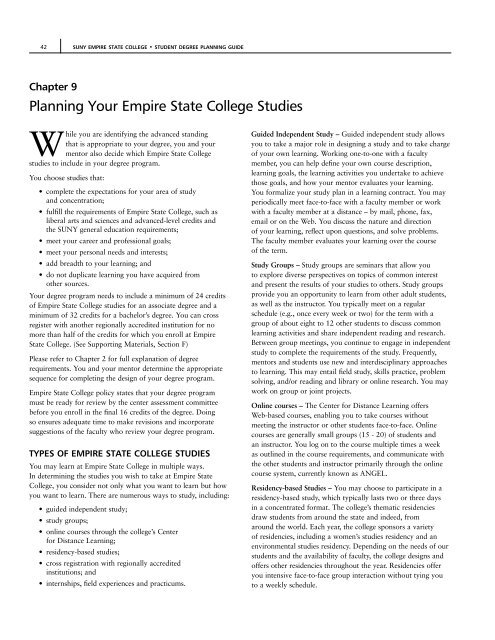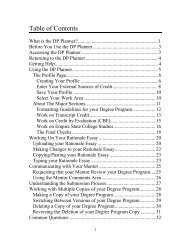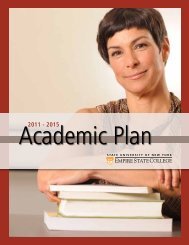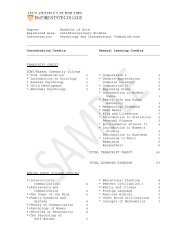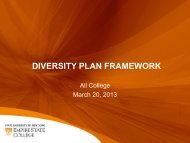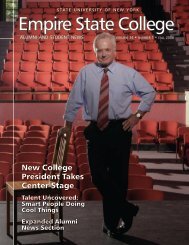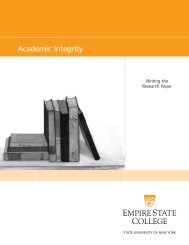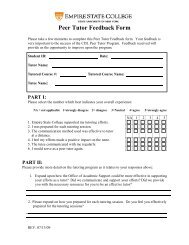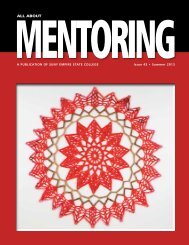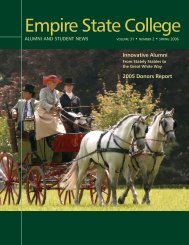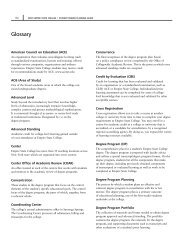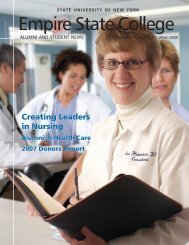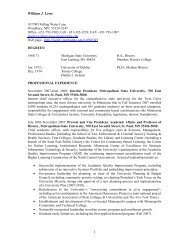Planning Your Empire State College Studies - SUNY Empire State ...
Planning Your Empire State College Studies - SUNY Empire State ...
Planning Your Empire State College Studies - SUNY Empire State ...
- No tags were found...
You also want an ePaper? Increase the reach of your titles
YUMPU automatically turns print PDFs into web optimized ePapers that Google loves.
42 suny empire state college • student degree planning guideChapter 9<strong>Planning</strong> <strong>Your</strong> <strong>Empire</strong> <strong>State</strong> <strong>College</strong> <strong>Studies</strong>While you are identifying the advanced standingthat is appropriate to your degree, you and yourmentor also decide which <strong>Empire</strong> <strong>State</strong> <strong>College</strong>studies to include in your degree program.You choose studies that:• complete the expectations for your area of studyand concentration;• fulfill the requirements of <strong>Empire</strong> <strong>State</strong> <strong>College</strong>, such asliberal arts and sciences and advanced-level credits andthe <strong>SUNY</strong> general education requirements;• meet your career and professional goals;• meet your personal needs and interests;• add breadth to your learning; and• do not duplicate learning you have acquired fromother sources.<strong>Your</strong> degree program needs to include a minimum of 24 creditsof <strong>Empire</strong> <strong>State</strong> <strong>College</strong> studies for an associate degree and aminimum of 32 credits for a bachelor’s degree. You can crossregister with another regionally accredited institution for nomore than half of the credits for which you enroll at <strong>Empire</strong><strong>State</strong> <strong>College</strong>. (See Supporting Materials, Section F)Please refer to Chapter 2 for full explanation of degreerequirements. You and your mentor determine the appropriatesequence for completing the design of your degree program.<strong>Empire</strong> <strong>State</strong> <strong>College</strong> policy states that your degree programmust be ready for review by the center assessment committeebefore you enroll in the final 16 credits of the degree. Doingso ensures adequate time to make revisions and incorporatesuggestions of the faculty who review your degree program.Types of <strong>Empire</strong> <strong>State</strong> <strong>College</strong> <strong>Studies</strong>You may learn at <strong>Empire</strong> <strong>State</strong> <strong>College</strong> in multiple ways.In determining the studies you wish to take at <strong>Empire</strong> <strong>State</strong><strong>College</strong>, you consider not only what you want to learn but howyou want to learn. There are numerous ways to study, including:• guided independent study;• study groups;• online courses through the college’s Centerfor Distance Learning;• residency-based studies;• cross registration with regionally accreditedinstitutions; and• internships, field experiences and practicums.Guided Independent Study – Guided independent study allowsyou to take a major role in designing a study and to take chargeof your own learning. Working one-to-one with a facultymember, you can help define your own course description,learning goals, the learning activities you undertake to achievethose goals, and how your mentor evaluates your learning.You formalize your study plan in a learning contract. You mayperiodically meet face-to-face with a faculty member or workwith a faculty member at a distance – by mail, phone, fax,email or on the Web. You discuss the nature and directionof your learning, reflect upon questions, and solve problems.The faculty member evaluates your learning over the courseof the term.Study Groups – Study groups are seminars that allow youto explore diverse perspectives on topics of common interestand present the results of your studies to others. Study groupsprovide you an opportunity to learn from other adult students,as well as the instructor. You typically meet on a regularschedule (e.g., once every week or two) for the term with agroup of about eight to 12 other students to discuss commonlearning activities and share independent reading and research.Between group meetings, you continue to engage in independentstudy to complete the requirements of the study. Frequently,mentors and students use new and interdisciplinary approachesto learning. This may entail field study, skills practice, problemsolving, and/or reading and library or online research. You maywork on group or joint projects.Online courses – The Center for Distance Learning offersWeb-based courses, enabling you to take courses withoutmeeting the instructor or other students face-to-face. Onlinecourses are generally small groups (15 - 20) of students andan instructor. You log on to the course multiple times a weekas outlined in the course requirements, and communicate withthe other students and instructor primarily through the onlinecourse system, currently known as ANGEL.Residency-based <strong>Studies</strong> – You may choose to participate in aresidency-based study, which typically lasts two or three daysin a concentrated format. The college’s thematic residenciesdraw students from around the state and indeed, fromaround the world. Each year, the college sponsors a varietyof residencies, including a women’s studies residency and anenvironmental studies residency. Depending on the needs of ourstudents and the availability of faculty, the college designs andoffers other residencies throughout the year. Residencies offeryou intensive face-to-face group interaction without tying youto a weekly schedule.
suny empire state college • student degree planning guide 43Cross Registration with Regionally Accredited Institutions –You may want to take a course at another college or universityfrom time to time to complete your degree requirementsat <strong>Empire</strong> <strong>State</strong> <strong>College</strong>. Perhaps you wish to study with aparticular scholar or want a specialized study that <strong>Empire</strong> <strong>State</strong><strong>College</strong> does not offer. You may enroll in a course for academiccredit at a college or university that is accredited by a recognizedregional accrediting agency. By doing so, you expand the varietyof learning resources available. Please review the policy on crossregistration in Supporting Materials, Section F.Internships, Field Experiences and Practicums – Studentsoften incorporate internships and/or field experiences intotheir degree programs. You may apply for formal internshipprograms established by state, local and national governments,as well as by corporations, nonprofit institutions, and collegesor universities. Alternatively, with the help of your mentor,you may arrange for a special internship designed around yourlearning goals.The decisions you make result from ongoing consultation withyour mentor.


